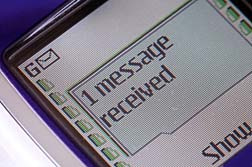 As an IT specialist, Simon has been researching the issue of blocking unwanted content, either by origin, content or en-mass technique. "I am sure that there exists a feature to block texts messages," he says, "but cellular carriers won't make it available. They have deployed a technology, aggressively marketed it and reaped the benefits of its engineering-in flaws because it was profitable to do so. I've read about people receiving hundreds of messages."
As an IT specialist, Simon has been researching the issue of blocking unwanted content, either by origin, content or en-mass technique. "I am sure that there exists a feature to block texts messages," he says, "but cellular carriers won't make it available. They have deployed a technology, aggressively marketed it and reaped the benefits of its engineering-in flaws because it was profitable to do so. I've read about people receiving hundreds of messages."One victim, who says he doesn't use text messaging, recently complained on a forum about a ten cent per incoming and outgoing message charge with Cingular then not being able to get an answer from Customer Service as to the origin of the call.
Quite often the messages are routed from a third-party provider. In early June AT&T received preliminary approval to settle a lawsuit that revealed its partnership with third parties which allowed customer accounts to be automatically charged for ringtones, wallpaper, daily jokes text messages and games. The charges only needed to be associated with a phone number to find their way onto the monthly bill. Profits were then shared by the mobile provider and the partner. As a result of the lawsuit, refunds will be distributed to all US citizens that were unfairly charged, and are retroactive from January 1, 2004 to May 30, 2008.
Caught in similar sneaky dealings, Sprint Nextel found itself, in mid-May, the target of a class action for the same deliberate unauthorized content charges.
There is a glimmer of justice looming for consumers, however. Television network NBC15 out of Montgomery reports that in May Alabama's Public Service Commission (PSC) adopted new rules to regulate third-party companies and their practice of loading unauthorized charges onto mobile bills, known as cramming. According to Commissioner Susie Parker, companies will be required to register with the PSC and disclose how they sign up new customers and clarify their charges. The general practice has been for these companies to acquire phone numbers through contests forms, direct mail sweepstakes and 800-numbers to psychics, free date lines and other adult services.
Under the new rules, the commission will post on its website a list of approved third parties from which local carriers can bill. Much welcome is the provision that gives customers the choice of blocking third-party providers from slipping charges onto their bill. This initiative has also provided customers with a one-stop complaint forum. "Hopefully what this will do is be an obstacle for those who intend to defraud the public," says director of PSC telecommunications division, Darrell Baker.
Beyond the mysterious origins of the services customers are charged for, the charges themselves are disputed. Text charges have become far more lucrative than the ordinary phone call; hence developing the text messaging ecosystem is where the marketing research dollars are being funneled. But how do the mobile content providers determine what customers actually want and need?
READ MORE UNAUTHORIZED MOBILE CONTENT LEGAL NEWS
One participant, Proctor & Gamble's digital marketing innovation manager, Jean Berberich, described their company's position as, "we are still on a test-and-learn phase. We are still trying to figure out… what consumers find valuable. Customers are interested in phones for help, rather than for contests or giveaways."
With the FTC and lawsuits trying to weed out the double-dipping practices of many mobile and content providers, some are actually aiming to make your mobile a friendlier, albeit lucrative, place. It is those who are bent on making you pay to read texts from telemarketers, cranks and spammers you might need a legal advice on.
